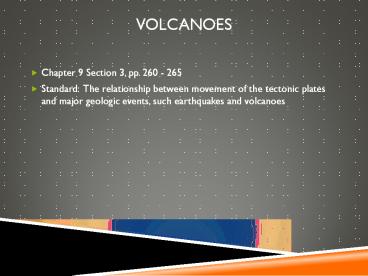Volcanoes - PowerPoint PPT Presentation
Title:
Volcanoes
Description:
VOLCANOES Chapter 9 Section 3, pp. 260 - 265 Standard: The relationship between movement of the tectonic plates and major geologic events, such earthquakes and volcanoes – PowerPoint PPT presentation
Number of Views:254
Avg rating:3.0/5.0
Title: Volcanoes
1
Volcanoes
- Chapter 9 Section 3, pp. 260 - 265
- Standard The relationship between movement of
the tectonic plates and major geologic events,
such earthquakes and volcanoes
2
EQ What is a Volcano?
- Volcano is a vent of fissure in the Earths
surface through which magma and gases are
expelled. - Magma is molten rock forced to the Earths
surface - Lava is magma that flows onto the Earths surface
3
EQ What are 2 types of Volcanic Eruptions?
- Non-Explosive
- The most common type of eruption
- Produces relatively calm flows of lava
- Found in much of the seafloor, Northwest regions
of the US, other vast regions on Earths
surface - Examples Mauna Loa Kilauea in Hawaii
4
EQ What are 2 types of Volcanic Eruptions
continued
- Explosive
- They are rare, but very destructive
- Clouds of hot debris, ash, and gas repeatedly
shoot out of the volcano - Pyroclastic flows erupt from the volcano
producing molten rock, which hardens in the air,
and dust sized particles of ash. The ash can
reach the upper atmosphere and circle the Earth
for years. - The lava and large pieces of debris are blasted
out of the volcano in a matter of seconds. This
can demolish an entire mountainside in seconds. - Example Mount St. Helens in Washington state
5
Shield Volcanoes
- Built of layers of lava released from
non-explosive eruptions. - Lava is very runny
- Layers of lava create a volcano with sloping
sides - Not very steep sides, but can grow to be enormous
- Tallest Mountain on Earth Mauna Kea in Hawaii
6
Mauna Loa (in Hawaii)
7
Cinder Cone Volcanoes
- Made of pyroclastic material from moderate
eruptions - Steep sides
- Small volcanoes
- Erupt for short periods of time
- Often occur in clusters on sides of volcanoes
- Erode away quickly because pyroclastic material
is not cemented together - Paricutin Mexican volcano appeared in a
cornfield in 1943 and erupted for 9 years
8
Cerro Negro (in Nicaragua)
9
Composite Volcanoes
- AKA Stratovolcanoes
- One of the most common types of volcanoes
- Form from explosive eruptions of pyroclastic
material followed by quieter lava flows - Lava and pyroclastic material form alternating
layers - Broad bases and steeper towards the top
- EX Mt. Hood, Mt. Shasta, Mt. Ranier, and Mt. St.
Helens (all in US) Mt. Fuji is in Japan
10
Mount St. Helens (Washington state)
11
EQ How does magma form and move?
- Forms in the lower crust upper mantle
- Caused by changes in heat pressure
- Usually the result of decreased pressure
- Rises to the surface since magma is less dense
than rock - Usually, at plate boundaries Ex Ring of Fire
In Pacific Ocean
- Formation of Magma
12
EQ Where do volcanoes form?
- _at_Rift Zones
- Deep cracks between divergent plates, like the
Mid-Ocean Ridge in the Pacific North Atlantic
Oceans - Remember Seafloor Spreading
13
- _at_Convergent Boundaries/Subduction Zones
- At oceanic continental plates
- Oceanic crust subducts under continental crust
- Oceanic water mixes with the mantle rock, melts
it allows magma to rise
14
- _at_Hot Spots
- Volcanically active areas far from plate
boundaries - Example Hawaiian Islands
15
EQ How does a Scientist Predict a Volcano is
going to Erupt?
- Classified in 3 categories
- Extinct has not erupted in recorded history and
probably will never erupt again - Dormant currently is not erupting, but the
record of past eruptions suggests the volcano
will erupt again - Active currently erupting or shows signs of
erupting again in the near future
16
Summary
- Explain how an earthquake can set off a volcano?































